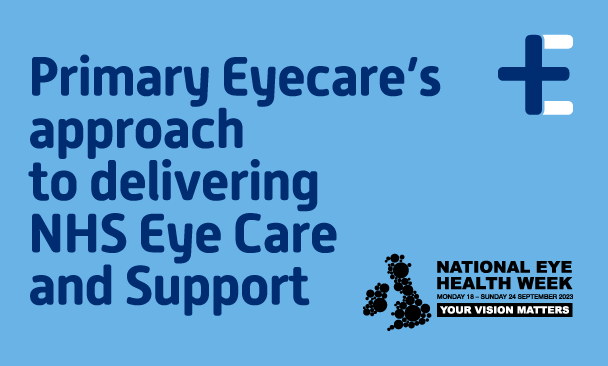Delivering NHS Eye Care and Support
18 September 2023
National Eye Health Week starts today, Monday 23 September. The theme for the first day of the 2023 campaign is NHS Eye Care and Support.

National Eye Health Week starts today, Monday 23 September. The theme for the first day of the 2023 campaign is NHS Eye Care and Support.
We thought this would be a good opportunity to talk about some of the ways we are currently working with local optical committees and optometry practices to improve patient services and support across England today – and also to explore how the service has progressively evolved over the past 75 years to represent the indispensable force that it has become today.
A potted history of NHS eye care services down the decades
The 40s and 50s
The history of NHS eye care services in the UK spans several decades since Aneurin Bevan first launched the initial scheme in 1948. At the time, the intention was for everyone to be able to access comprehensive healthcare services – including eye care – free at the point of delivery, funded by National Insurance taxation. At the start, the service focused mainly on sight testing and dispensing prescriptions for glasses.
The 60s and 70s
During the sixties and seventies, the service expanded to cover the diagnosis and treatment of eye diseases and conditions affecting vision. At the same time, the optometry profession was coming to the fore as the ‘go to’ specialists for these issues and public awareness of the additional services they could do to help gradually increased.
The 80s
The eighties saw the introduction of NHS optical vouchers which gave patients financial assistance to buy glasses. This was a welcome move, making eye care more accessible to a wider range of people.
The 2000s
In the early 2000s, the Primary Eyecare Assessment and Referral Service (PEARS) was introduced. PEARS allowed accredited optometrists to assess and refer patients with minor eye conditions directly to specialist services, which resulted in reducing the burden on GPs and secondary care.
The 2010s
Ten years later, community-based services were exponentially expanded with the launch of Community Eye Care Services. These offered more accessible and convenient options for detecting, diagnosing and treating a range of eye ailments, close to patients’ homes and within minimum waiting times.
The 2020s
Bringing us right up to current times, the NHS eye care service in England is still handling the fall-out from the COVID-19 pandemic several years on. Significant backlogs have built up as many routine eye tests were postponed or rescheduled to prioritise urgent and essential care during social isolation. Because, in many cases, these appointments never actually took place, we are seeing a negative impact on patient uptake.
A new trend we witnessed, directly related to the pandemic, was the emergence of telemedicine and virtual consultations. These new ways of working are continuing to evolve even though the crisis has passed – and feedback tells us patients very much welcome the comfort and convenience of being offered online appointment options.
Our key service priorities today
At Primary Eyecare, NHS eye care services, delivered through more than 2,300 local optometry practices, demonstrate a comprehensive and inclusive approach to maintaining and improving the eye health and vision of the communities in which we work. During the year 2022/23 the network of practices saw over 582,000 patients.
Services currently include: Community Eye Care Services (CUES), Minor Eye Care Services (MECS), Childrens’ Services, Pre and Post Cataract Care, Glaucoma Enhanced Referral Service (GERS), Low Vision Services and the patient centered Easy Eye Care Service, developed in conjunction with LOCSU and our charity of the year, SeeAbility, for people with learning disabilities and autism.
‘‘At Primary Eyecare, we consider our purpose to work with local optical committees to support the transformation of primary and community eye care services for the benefits of patients, practices and commissioners by engaging and optimising the skills and resources of eye health practitioners locally.
We are driven by the overarching vision of a healthier, more equitable future, where everyone enjoys the benefits of clear sight and optimal eye health.’
Dharmesh Patel, Chief Executive Officer
How we are supporting the rest of National Eye Health Week 2023
Primary Eyecare is actively promoting NEHW’s key messages all this week and will be sharing information on our social media platforms throughout the campaign. Spotlighting some of the campaign’s daily themes, we will be signposting a range of sources for further information about the link between holistic healthcare and better eye health and vision.
Look out for news coming soon about a chance to help raise funds for our charity of the year, SeeAbility and to be entered into a prestigious prize draw as a result!